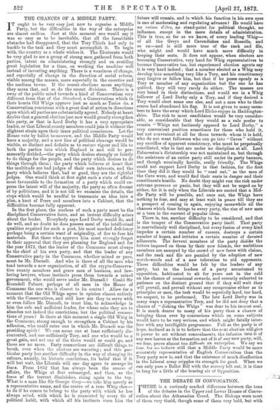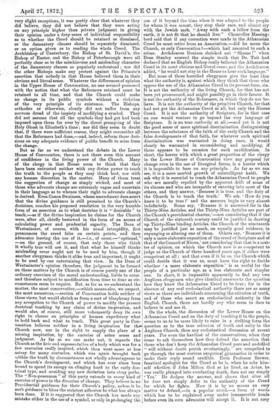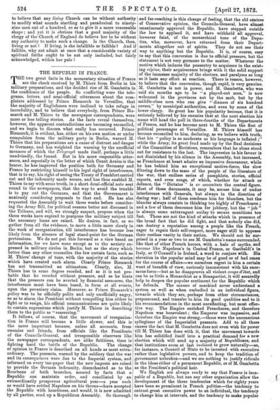THE DEBATE IN CONVOCATION.
THERE is a curiously marked difference between the tone of the debates in the Upper and Lower Houses of Convo- cation about the Athanasian Creed. The Bishops were most of them very timid, though some of them very bold, but with
very slight exceptions, it was pretty clear that whatever they did believe, they did not believe that they were acting on any principle higher than private judgment in giving their opinion under a deep sense of individual responsibility as to whether the Creed should be retained or dismissed, or the damnatory clauses should be separately dismissed, or an option given as to reading the whole Creed. The Archbishop of Canterbury, the Bishop of St. David's, the Bishop of Exeter, and the Bishop of Peterborough were all perfectly clear as to the mischievous and misleading character of the damnatory clauses as popularly understood ; nor did the other Bishops make any protest against the Primate's assertion that nobody in that House believed them in their obvious and literal sense. Whatever the differences of opinion in the *Upper House of Convocation, no one seemed possessed with the notion that what the Reformers retained must be retained to all time, and that the Church could make no change in its public symbols without a violation of the very principle of its existence. The Bishops, orthodox or otherwise, clearly did not suffer from any nervous dread of the impiety of modifying a symbol. They did not assume that all the symbols they had got had been imposed upon them for ever by the direct prompting of the Holy Ghost in Elizabeth's time ; nor did they seem to doubt that, if there were sufficient reason, they might reconsider all that the Reformers had done,—and, indeed, reform those deci- sions on any adequate evidence of public benefit to arise from the change.
But as far as we understand the debate in the Lower House of Convocation, there is not there even this amount of confidence in the living power of the Church. Many of the clergy in that House seem to think that they have been entrusted neither with any divine power to teach the truth to the people as they may think best, nor with any human discretion in the matter. Many of them treat the suggestion of change as simply wicked, and most of those who advocate change are extremely vague and uncertain in their language as to whence their right to advocate change is derived. Even Canon Swainson, whose amendment does assert that the divine guidance is still promised to the Church's decisions, couches his proposed resolution in the very humble form of an assertion as to what doctrine it is " desirable " to teach,—as if the divine inspiration he claims for the Church were, after all, chiefly bestowed in the form of an access of calculating power and prudential sagacity. The Dean of Westminster, of course, with his usual intrepidity, first pronounces the creed false on certain points, and then advocates leaving the use of of error,—" optional," —on the ground, of course, that only those who think it wholly true will use it, and that what he himself thinks misleading error ought not to be used by him, though if another clergyman thinks it alike true and important, it ought to be used by one entertaining that view. In the Dean of Westminster's opinion therefore, the judgment to be formed on these matters by the Church is of course purely one of the ordinary exercises of the moral understanding, liable to error, and therefore subject to modification from time to time as cir- cumstances seem to require. But, as far as we understand the matter, the most conservative,—which means also, we suspect, the most numerous,—section of Convocation holds neither of these views, but would shrink as from a sort of blasphemy from any arrogation to the Church of power to modify the present doctrinal teaching by any claim of divine inspiration, and would also, of course, still more vehemently deny its own right to choose on principles of human expediency what to hold back• and what to teach. This great party in Con- vocation believes neither in a living inspiration for thee Church now, nor in the right to supply the place of a missing inspiration, by the exercise of sober sense and judgment. As far as we can make out, it regards the Church as the heir and representative of a body which was for a few centuries really inspired, which then went more or less astray for many centuries, which was again brought back within the truth by circumstances not wholly advantageous to the Church's development, and which has ever since been bound to spend its energy on clinging haid to the early doc- trinal type, and avoiding any new deviation into stray paths. The "Non-possumuS " of thia party extends to every kind of exercise of power in the direction of change. They believe in no Providential guidance "for their Church's policy, unless it be such guidance to bless the `strictest adhesion to what has always been done. If it is suggested -that the Church has made any mistake either in the use of a sytnbol, or only in prolonging the
use of it beyond the time when it was adapted to the people for whom it was meant, they stop their ears, and almost cry with the Jewish mob, "Away with such a fellow from the earth, it is not fit that he should live." Chancellor Massing- herd said that if any correction were made in the Athanasian Creed he must retire from an Association,—did he mean the Church, or only Convocation ?—which had assented to such a crime. Archdeacon Denison shrieked out "Shame !" when Dean Stanley averred the simple truth that Dr. Tait had declared that no English Bishop really believed the Athanasian Creed in its most obvious and literal sense, and the Archdeacon added, "he would not stay in the House to hear such language."
But none of these horrified clergymen give the least idea what the authority is, against which they think that those who oppose the use of the Athanasian Creed in its present form, sin. It is not the authority of the living Church, for that has not been yet pronounced, and might possibly go in their favour. It is not the authority of the Reformers, in which they do not be- lieve. It is not the authority of the primitive Church, for that had not got the Athanasian Creed at all, but only the Nicene Creed. It is not the authority of Scripture, for in that case no one would venture to go beyond the very language of Scripture. It is no true authority at all ;—and yet it is not the good sense of mere spiritual discrimination distinguishing between the substance of the faith of the early Church and the false developments of that faith, for whatever such spiritual discrimination was warranted in doing once, it would clearly be warranted in reconsidering and modifying, if there appears to be occasion for such modification. In short, the horror with which a great proportion of the clergy in the Lower House of Convocation view any proposal for change even in the use of liturgical forms, is a horror which it is impossible to base on any principle. As far as we can see, it is a mere morbid growth of unintelligent habit. We ask why it is essential to teach the Athanasian Creed to people who are morally repelled by the apparent drift of some of its clauses and who are incapable of entering into most of the others, and they answer, Because it is true, and the duty of the Church is to teach the truth.' We ask, How do you know it to be true ?' and the answers begin to vary almost indefinitely. Some say, Because it is answered for in the Thirty-Nine Articles, and the Thirty-Nine Articles are part of the Church's providential charter,'—not considering that if the Church of the sixteenth century could be justified in drawing up Thirty-Nine binding Articles, the Church of the nineteenth may be justified just as much, on equally good evidence, in expunging or altering one of them. Others Bay, Because it is only a more elaborate exposition of the creed of Scripture and of that of the Council of Nicaaa,' not considering that that is a mat- ter of opinion, on which the Church now is as competent to judge as the Church of three hundred years ago, if either were competent at all ; and that even if it be so, the Church which could decide that it was so, must have the right to decide whether a more elaborate exposition' is as useful for the people of a particular age, as a less elaborate and simpler one. In short, it is impossible apparently to find any two Anglican clergymen who give identical answers to the question how they know the Athanasian Creed to be true ; for in the absence of any real ecclesiastical authority there are as many views as there are individuals concerning the criterion of truth, and of those who assert an ecclesiastical authority in the English Church, there are hardly any who seem to dare to believe in and use it.
On the whole, the discussion of the Lower House on the Athanasian Creed and on the duty of teaching it to the people, seems to us to be more likely to raise in a striking form the question as to the true criterion of truth and unity in the Anglican Church, than any ecclesiastical discussion of recent years. For even the hardiest of the conservatives, when they come to ask themselves how they defend the assertion that those who don't keep the Athanasian Creed pure and undefiled "will without doubt perish everlastingly," are compelled to go through the most curious exegetical gymnastics in order to make their reply sound credible. Even Professor Brewer, fanatical apologist for the Creed as he is, when he asks him- self whether, if John Milton died as he lived, an Arian, he was really plunged into everlasting death, dare not say simply
Yes.' He dodges the answer, and shows that after all he does not simply defer to the authority of the Creed for which he fights. Now it is by no means an easy matter to defend,—in a popular creed,—a form of words which has to be explained away under innumerable heads before even its own advocates will accept it. It is not easy
to believe that any living Church can be without authority to modify what sounds startling and paradoxical to ninety- nine men out of a hundred, so as to give it a more reasonable shape ; and yet it is obvious that a good majority of the clergy of the Church of England do believe her to be without any authority to make such a change. Is the Church, then, living or not ? If living, is she infallible or fallible ? And if fallible, why not admit at once that a considerable variety of spiritual faiths ought to be not only included, but fairly acknowledged, within her pale ?




































 Previous page
Previous page